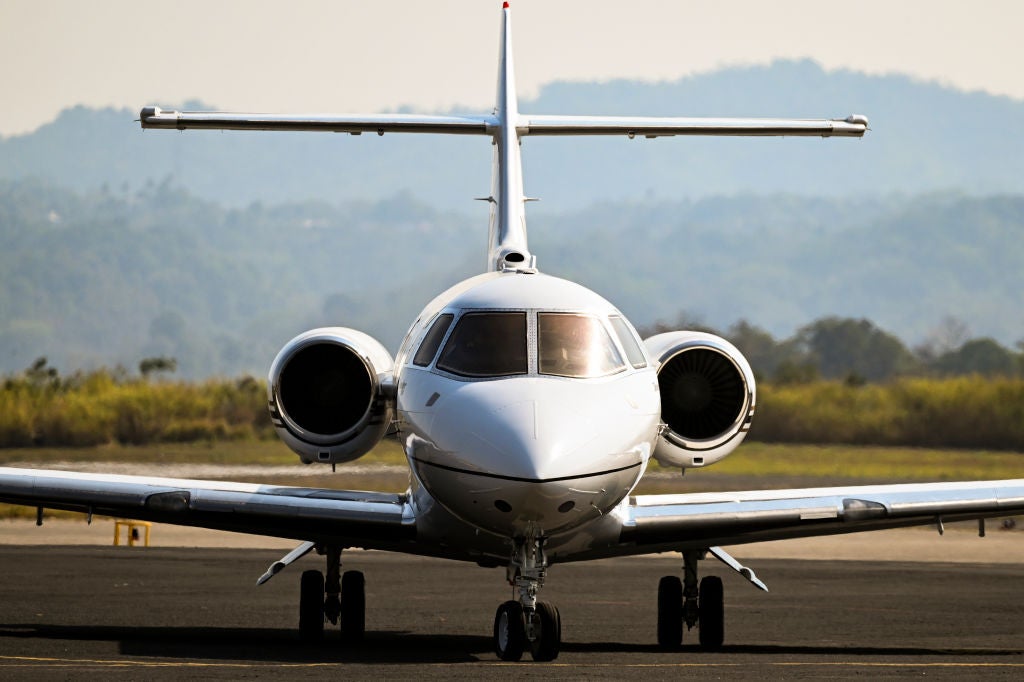
The private jet sector has boomed since the start of the pandemic, reveals a report from the progressive think tank Institute for Policy Studies (IPS) and nonpartisan organisation Patriotic Millionaires.
While there was a drop in private flights in 2020, the sector picked up quickly again and saw an unprecedented number of 5.3 million business jet operations in 2022.

Discover B2B Marketing That Performs
Combine business intelligence and editorial excellence to reach engaged professionals across 36 leading media platforms.
Compared to 2019, the number of flights globally and in the US increased by around a fifth last year. A 2022 study found that because of the increased flights, private jet emissions have increased by 23%.
In the last two decades, the global private jet fleet size increased 133% – from 9,895 in 2000 to 23,122 in mid-2022.
Private jet travel is reserved for the few. The typical private jet owner has a net worth of $190m, according to the report. Since private jets emit at least ten times more than commercial planes per passenger, these ultra-rich private flyers are causing a disproportionate amount of emissions.
Awareness of environmental impact
Awareness about the environmental costs of private jets has been increasing, putting frequent flyers under scrutiny. Celebrity Kylie Jenner made headlines last summer when she used her private jet for a short hop of just 17 minutes, a trip that would have taken less than an hour by car.

US Tariffs are shifting - will you react or anticipate?
Don’t let policy changes catch you off guard. Stay proactive with real-time data and expert analysis.
By GlobalDataA Twitter account tracking private jet flights of celebrities – since suspended, together with a similar account tracking Elon Musk’s flights – showed that this trip was far from unusual for the rich and famous.
Some countries have already passed stricter legislation or taxes on the use of private jets. Canada added a 10% tax on the purchases of luxury aircraft.
As emissions from private jet flights more than doubled in Europe last year, France wants a taxation or regulation system at the national or European level. The country has already banned domestic short-haul flights between cities connected by a short train journey. The Netherlands’ main airport recently announced it will ban private jets. The US, the largest private jet market, has not announced any stricter legislation yet.
The US has committed to net-zero emissions by 2050, and to do that, it should target the super-emitters, say IPS and Patriotic Millionaires.
“Considering the disproportionate emissions that private jets produce, it would be folly to ignore private aviation as a significant driver of the climate crisis,” reads the report. “The US needs to pass policies to disincentivize the use of private jets.”
Increasing taxes could disincentivise private jets
Part of their suggestions to disincentivise private flights is higher taxes. The report found that despite private jets making up around 1 in 6 flights handled by the Federal Aviation Administration (FAA), the sector contributes just 2% of taxes that make up the FAA’s Airport and Airways Trust Fund, which covers investments in the US airport and airways system. Instead, the majority (around 70%), is financed by passengers who travel commercially.
“Passengers pay a 7.5% tax on the prices of their tickets plus a passenger facility charge of no more than $4.50,” according to the report. “Meanwhile, private jet fliers only pay fuel surcharge taxes – roughly $0.22 per gallon of jet fuel.”
Additionally, the report points out that airports that may not offer scheduled passenger services, but cater to private corporate jets alone, are still funded by the public.
IPS and Patriotic Millionaires advocate for a transfer fee on preowned and new private aircraft and an increased jet fuel tax. If implemented, the organisations said the transfer fee could have raised $2.6bn in 2022. Elon Musk alone, the most active high-flyer in the US, would have had to pay an additional $3.94m in taxes for 2022 if both measures were implemented.
Musk took 171 private flights in 2022, which were responsible for 2,112 tonnes of carbon emissions – 132 times the size of the average US citizen’s total annual footprint.
This article was originally published on our sister site, Energy Monitor.





